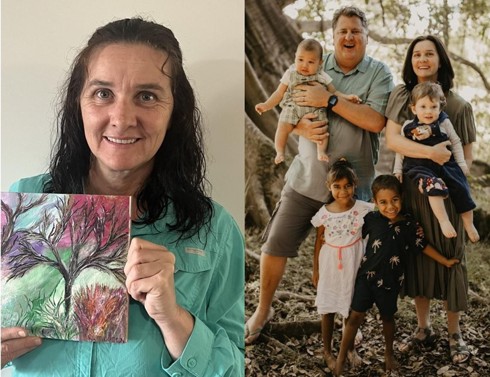The aged care nurse who experienced aphasia and is now teaching residents to talk again
04/04/2024

Nurse practitioner Rebecca More, who experienced aphasia (which leaves a person unable to communicate effectively with others), is now achieving remarkable results with aged care residents who have experienced strokes, live with dementia and other debilitating conditions, at the Not For Profit Forest View aged care home in Childers, 51km south-southwest of Bundaberg, Queensland.
After being Director of Nursing at Queensland’s Central West Hospital and Health Service, Rebecca had taken a role as a remote area nurse in the Northern Territory in 2022. But on 29 November 2022, she suffered what her husband Grant, a second-year nursing student, thought was a stroke – Rebecca was unable to talk or write.
An MRI at Alice Springs Hospital showed a hole in her heart had led to four blood clots developing in the left side of her brain, blocking the blood supply to the part of the brain responsible for comprehension and production of language and causing the language disorder of aphasia.
When she was discharged, Rebecca was told she may never return to nursing.
Grant began teaching Rebecca about language, feelings, and the world around her. They returned to a house they owned in Townsville, and after three months of frustration with treatment, they discovered a former colleague Dr Bryce Nichols was practising in the city and made contact.
Dr Nichols organised the cardiology appointments to repair the hole in Rebecca's heart, and the neurology, speech therapist and physiotherapy appointments she needed.
“Stroke is one of those conditions where the most important factor is rehabilitation,” he said.
He said Rebecca’s rehabilitation journey was “remarkable”, primarily due to the awakening of artistic talents in Rebecca of which she had shown no signs prior to the stroke.
“Stroke has this tendency to take so much away,” Bryce said.
“But I think Bec’s a great example of where it’s unmasked abilities she’s never know she had before.”
10 months after her stroke, the Australian Health Practitioner Regulation Agency (AHPRA) gave Rebecca clearance to resume her nursing career. After regaining her registration, Rebecca called a former colleague from her remote nursing days, Julie Mayor, the CEO of Forest View.
Since moving to Childers in February and starting at Forest View, Rebecca said she is gradually building back her familiarity with the career that made up such a significant part of her life before the stroke.
“It’s been great ... I’m starting to feel it’s not as foreign anymore, so I’m starting to feel like a nurse again,” she said.
Julie said Rebecca’s experience as a stroke survivor, including her use of art to further her rehabilitation, made her an invaluable contributor to Forest View’s innovative approach to stimulating residents’ creativity through activities oriented around art and music.
Rebecca’s clinical knowledge was intact, with her only challenges being around recalling the correct terminology at times.
“She can run rings around me with her knowledge about everything, but she just has trouble sometimes to find the right word,” Julie said.
Due to her close familiarity with aphasia, Rebecca has already worked wonders in coaxing language from some residents who had not spoken for as long as they had been at Forest View.
“Because she’s gone through the experience of people believing that she didn’t know anything, because she couldn’t speak, she’s able to then resonate with older people who have that same experience with stroke, dementia, or anything else,” Julie said.
One resident, a man in his eighties named Keith, had not spoken for four years until Rebecca worked with him for just one hour.
“He got to a stage where he looked at her and said, "you’re wonderful",” Julie said.
Rebecca said her approach involved “finding a light” for residents to make their way out of a tangle of frustration and confusion when they were attempting to speak.
“You want to be able to communicate, but it’s like being in a prison in your brain,” she said.
“So, when I’m speaking with residents that have had a stroke, I remind them that we need to find a light for them to get out of that particular area where they’re feeling frustrated.”














